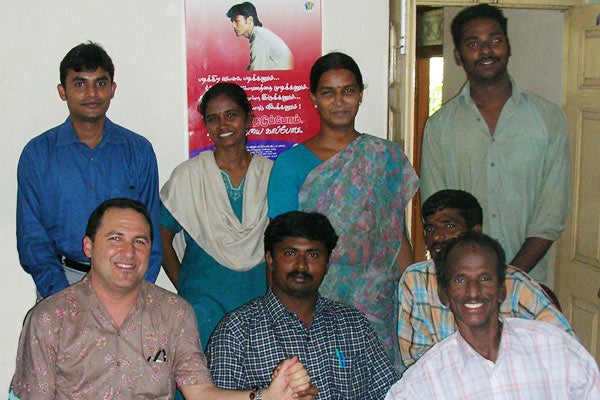
Leading a global effort to prepare for an HIV vaccine
Published: November 30, 2012
When an HIV vaccine is finally available, the University of Toronto’s Peter A. Newman wants to be sure the world is ready for it.
Backed by Canadian HIV Vaccine Initiative funding from the federal government and the Bill and Melinda Gates Foundation, Professor Newman is building an international team of researchers in social science to address challenging issues such as access, cost, stigma and misinformation. With a $3.5 million grant from the Canadian Institutes of Health Research (CIHR), he has been able to assemble experts working in India, Thailand and South Africa.
“This Team Grant has been incredibly helpful,” says Newman. “It has opened doors and provided great opportunities for sustained collaboration with researchers and community-based organizations in several low- and middle-income countries.”
Newman’s grant allows him to bring together disparate research projects and add a focus on South Africa, which has highest number of people living with HIV on the planet.
“In South Africa, 5.6 million people—one in five adults—are living with HIV; AIDS has resulted in almost 2 million orphaned children,” says Newman. “There is hope—the number of new HIV infections has declined substantially since 2000; but with 900 South Africans continuing to contract HIV every day and more than 500 a day dying from AIDS-related diseases, a vaccine is sorely needed.”
The team seeks answers to such questions as: if an HIV vaccine was discovered tomorrow, would everybody have access to it? With higher HIV rates typically coinciding with lower income countries, could people in these countries get access to the vaccine?
"How can we address the stigma and misinformation associated with HIV and many of the populations most-at-risk for HIV infection, which might otherwise create barriers to accessing a vaccine?" Newman asks.
Many of the countries involved in the research had been working independently with Canada, but one of Newman’s goals has been to help build productive relationships between nations plagued with some of the highest rates of HIV infection.
“Rather than supporting only bilateral relationships between Canada and India or Canada and South Africa, the grant enables me to forge collaborations between India and South Africa,” says Newman. “As I see it, it’s a 1 + 1 = 3 synergistic effect.”
The project has also provided important opportunities for Canadian graduate students to engage in global health research.
“We are able to give graduate students a unique and valuable opportunity to engage in global health research, which provides a competitive edge in an increasingly challenging marketplace,” says Newman. “In addition to providing training in an extremely important area of research, the opportunities to work with researchers and other graduate students in low- and middle-income countries benefits everyone involved.”



